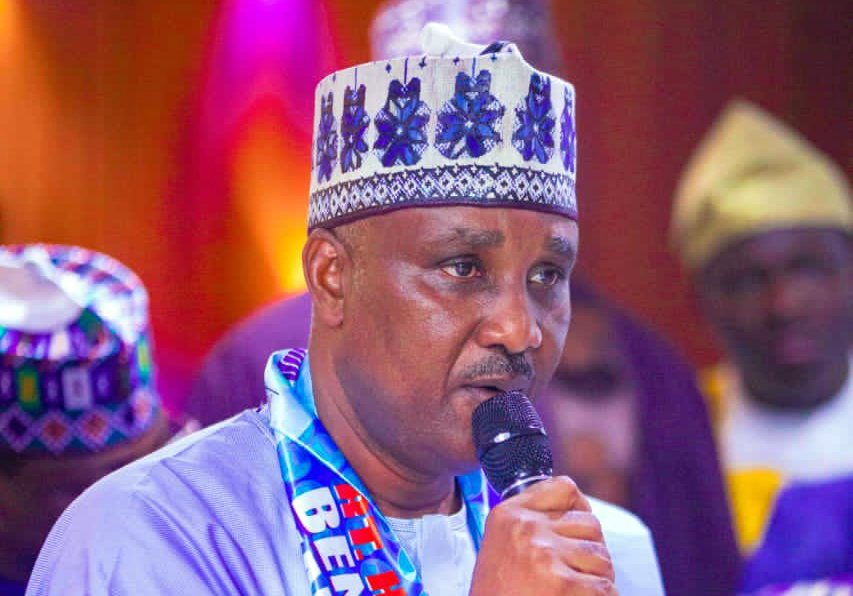By Mercy Aikoye
The Speaker of the House of Representatives Rt. Hon. Abbas Tajudeen, Ph.D, has stated that the 10th House under his leadership has ensured an inclusive and participatory legislature in the past one year.
The Speaker also noted that the House has been implementing its Legislative Agenda, which it introduced in October, 2023.
Speaker Abbas spoke on Wednesday at the National Assembly when he unveiled the one-year scorecard of the 10th House of Representatives at the opening of a 3-day ‘Open Week’ celebration organized by the Green Chamber.
The event was also to celebrate 25 years of unbroken legislature in the history of the National Assembly.
Speaker Abbas acknowledged the enormity of the challenges before the House flowing from the socioeconomic hardship confronting Nigerians. He said the Green Chamber rose to the occasion by introducing a total of 1,351 bills, the highest number in any first session since 1999, with 89 of the bills passed.
He emphasized that the most critical aspects of citizen engagement is accountability, noting that “The 10th House of Representatives has been committed to running an open House that actively incorporates citizens’ input in lawmaking and oversight processes. We have made concerted efforts to listen to the voices of our constituents and reflect their aspirations in our legislative activities.
“Through town hall meetings, public hearings, and stakeholder engagements, we have ensured that the legislative process remains inclusive and participatory. This approach not only enhances the quality of our laws but also ensures that our decisions are rooted in the genuine needs and desires of the Nigerian people. No chamber of the National Assembly has undertaken such an initiative.
“By doing so, we demonstrate our commitment to transparency and readiness to be held accountable by the people we serve. Presenting our Scorecard publicly allows us to showcase our achievements, acknowledge our challenges, and highlight our plans for the future. It reinforces the idea that the parliament is not just a body that makes laws but an institution that is responsible to its constituents for its actions and performance.
“This performance assessment was undertaken to evaluate how effectively the 10th House of Representatives has implemented its legislative agenda within its first session. The assessment serves several key purposes: (i) to gauge the level of preparedness and institutional capacity of the 10th House to deliver on its mandate amid challenging national circumstances, (ii) to assess the maturity of our democracy, which is largely dependent on the efficiency of the legislative arm of government, and (iii) to document the assessment report as a valuable resource in the growing literature of legislative activism.
Explaining the sectoral importance of legislative interventions of the House in the last one year, Speaker Abbas noted that a critical appraisal was informed through a robust study that highlighted the various efforts and their impacts using key standing committees of the House with a view to providing accurate feedback mechanism that serves as a guide for future legislative engagements.
“Findings from the study reveal significant developments in legislative activism. In its first session, the House introduced 1,351 bills, the highest number in any first session since 1999. Of these, 89 bills were passed, reflecting the House’s commitment to legislative efficiency and effectiveness. The legislative agenda prioritises economic empowerment and diversification to reduce Nigeria’s reliance on oil exports. Key bills include the Electricity Act (Amendment) Bill, 2023, which aims to enhance the efficiency and sustainability of Nigeria’s electricity sector by promoting investment in renewable energy sources.
Speaker Abbas listed a few other bills passed by the House in one year to include the Federal Audit Service Act (Amendment) Bill, 2023, the Administration of Criminal Justice Act (Repeal and Enactment) Bill, 2023; the Federal Fire and Rescue Service Bill, 2023; the Oath Act (Repeal and Enactment) Bill, 2023; the Control of Small Arms and Light Weapons Bill, 2023; the Niger Delta Development Commission Act (Amendment) Bill, 2023; the South East Development Commission (Establishment) Bill, 2023; the Nigerian Medical Research Council (Establishment) Bill, 2023, among others.
On public hearings, the Speaker said “analysis of sessional reports from committees of the First Session of the 10th House reveals that committees conducted numerous public hearings between November and December 2023. Also, as of June 13, 2024, 679 motions were moved on the floor of the 10th House. Of these, 672 (99%) were being considered at various committees, while seven (1%) were negatived. Among these motions, 43 (6.0%) were referred to ad-hoc committees and 629 (93%) to standing committees.”
Speaking on the oversight visits and inspections by the House in one year, the Speaker disclosed that “the House Committees visited 107 Ministries, Departments, Agencies (MDAs) and projects nationwide. This is despite most standing committees being inaugurated between November and December 2023, averaging 1-2 visits per committee. These visits aimed to ensure that government programs and administration were implemented effectively, efficiently, and in alignment with legislative intent.”
“The House committees held a total of 502 meetings in the first session of the 10th House. Further analysis shows the frequency distribution of meetings conducted by 117 House committees. The data reveals that 91 committees (77.8%) conducted between 1 and 5 meetings, 21 committees (17.9%) held between 6 and 10 meetings, and 4 committees (3.4%) held more than 11 meetings each. However, one committee did not convene any meetings during this period, he added.
The Speaker also highlighted legislative efforts towards conflict resolution of public complaints through the House Committee on Public Petitions where a total of 240 petitions were received in one with 40 of those cases closed while 10 have been laid before the House for resolution. Same has also been demonstrated in cases of industrial disputes between the organized labour and government.
“The 10th House has also played a pivotal role in mediating conflicts and ensuring the smooth resolution of crises before they escalate. A notable example of their intervention is with the Nigerian Labour Congress (NLC), where the timely dialogue and negotiations led to the successful call-off of a nationwide strike, thereby averting further potential economic disruptions. Additionally, the House’s proactive engagement with the Nigerian Teachers Union swiftly resolved their grievances, ensuring minimal disruption to the educational sector. Similarly, their effective mediation with the Nigerian Medical Association facilitated the resolution of key issues, promoting stability within the healthcare sector,” the Speaker said.
Speaker Abbas noted that these efforts and the resultant effects were products of a harmonious working relationship that exists between the 10th House and the Executive arm of government under President Bola Ahmed Tinubu.



